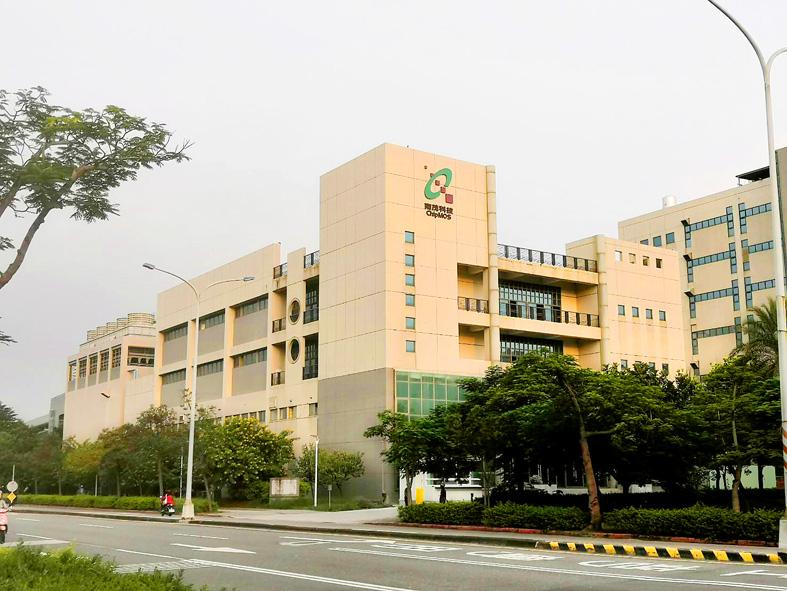ChipMOS Technologies Inc (南茂科技) has pledged to invest NT$12.5 billion (US$418.2 million) in expanding capacity in Taiwan, the Ministry of Economic Affairs announced yesterday as it approved the driver IC and memorychip tester and packager’s application to participate in a government incentive program.
The capacity expansion would help ChipMOS explore new business opportunities in the 5G and automotive fields, the ministry said in a statement.
It would also enable the company to expand its presence in the DRAM chip business after South Korean rivals exited the market, the ministry said.

Photo: Yang Chin-cheng, Taipei Times
It would be the firm’s second investment through the Invest Taiwan initiative, it added.
Through the new investment, the company is planning to expand its clean-room space in factories in Tainan and Hsinchu, build new smart and automated production lines, and advance its testing and packaging technologies for memory chips, driver ICs and mixed signal chips, the ministry said.
Part of the investment would also be allocated to build solar energy facilities, it said.
Innodisk Corp (宜鼎國際), a manufacturer of flash memory and DRAM modules used in industrial devices, was approved to join the progam and invest more than NT$100 million to add two new smart and automated production lines at factories currently under construction in Yilan County, the ministry said.
Tyan Kuei Enterprise (天貴實業), a supplier to footwear companies Nike Inc, Adidas AG and Puma SE, is planning to invest NT$400 million in a new factory and automated production lines in Changhua County to expand capacity, while machine tool part maker Long Shen Precision Industrial Co Ltd (隆升精密) is planning to invest NT$200 million to improve production efficiency and reduce carbon emissions at its factories in Taichung, the ministry said.
With the new investments from those four companies, the ministry has attracted 1,224 companies pledging to invest a combined NT$1.75 trillion and creating 136,393 new jobs, it said.

Vincent Wei led fellow Singaporean farmers around an empty Malaysian plot, laying out plans for a greenhouse and rows of leafy vegetables. What he pitched was not just space for crops, but a lifeline for growers struggling to make ends meet in a city-state with high prices and little vacant land. The future agriculture hub is part of a joint special economic zone launched last year by the two neighbors, expected to cost US$123 million and produce 10,000 tonnes of fresh produce annually. It is attracting Singaporean farmers with promises of cheaper land, labor and energy just over the border.

US actor Matthew McConaughey has filed recordings of his image and voice with US patent authorities to protect them from unauthorized usage by artificial intelligence (AI) platforms, a representative said earlier this week. Several video clips and audio recordings were registered by the commercial arm of the Just Keep Livin’ Foundation, a non-profit created by the Oscar-winning actor and his wife, Camila, according to the US Patent and Trademark Office database. Many artists are increasingly concerned about the uncontrolled use of their image via generative AI since the rollout of ChatGPT and other AI-powered tools. Several US states have adopted

KEEPING UP: The acquisition of a cleanroom in Taiwan would enable Micron to increase production in a market where demand continues to outpace supply, a Micron official said Micron Technology Inc has signed a letter of intent to buy a fabrication site in Taiwan from Powerchip Semiconductor Manufacturing Corp (力積電) for US$1.8 billion to expand its production of memory chips. Micron would take control of the P5 site in Miaoli County’s Tongluo Township (銅鑼) and plans to ramp up DRAM production in phases after the transaction closes in the second quarter, the company said in a statement on Saturday. The acquisition includes an existing 12 inch fab cleanroom of 27,871m2 and would further position Micron to address growing global demand for memory solutions, the company said. Micron expects the transaction to

A proposed billionaires’ tax in California has ignited a political uproar in Silicon Valley, with tech titans threatening to leave the state while California Governor Gavin Newsom of the Democratic Party maneuvers to defeat a levy that he fears would lead to an exodus of wealth. A technology mecca, California has more billionaires than any other US state — a few hundred, by some estimates. About half its personal income tax revenue, a financial backbone in the nearly US$350 billion budget, comes from the top 1 percent of earners. A large healthcare union is attempting to place a proposal before